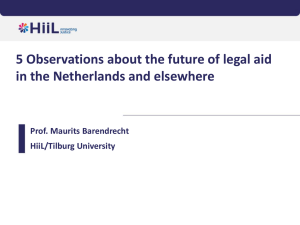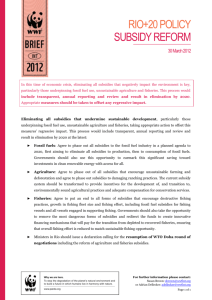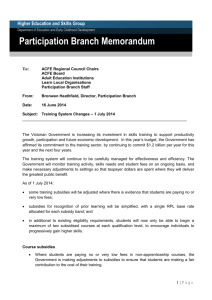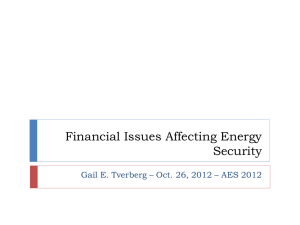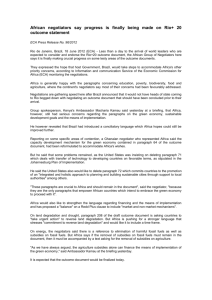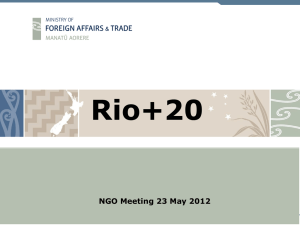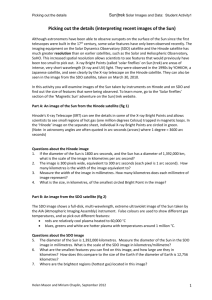EESC-2015-03826-00-00-PV-TRA
advertisement
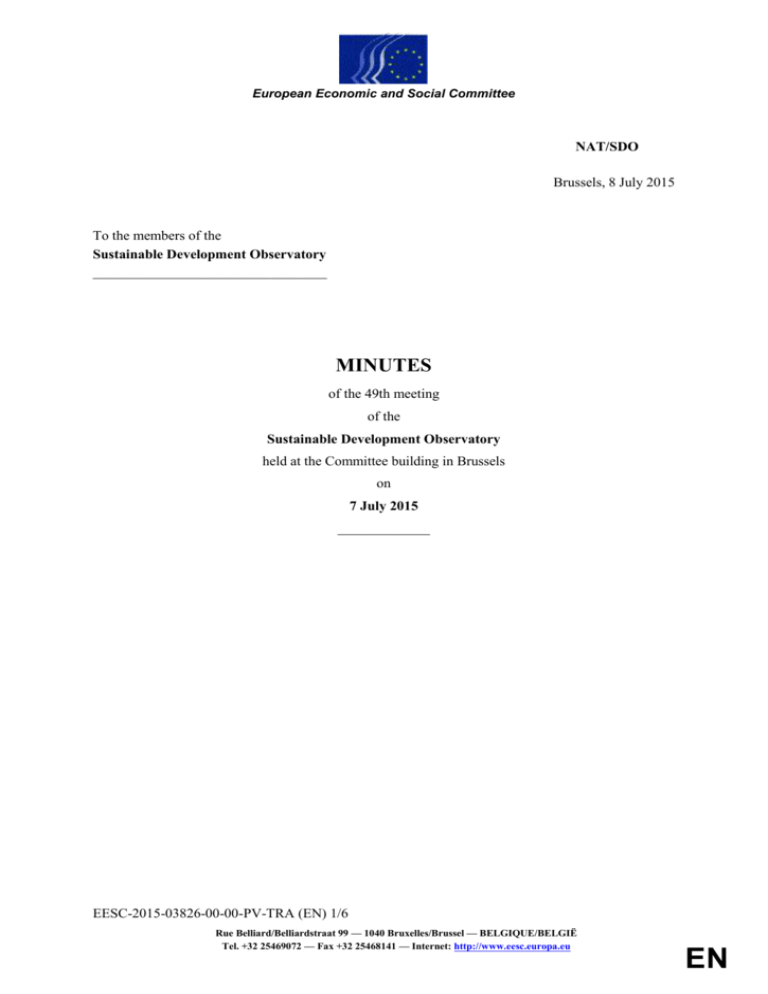
European Economic and Social Committee NAT/SDO Brussels, 8 July 2015 To the members of the Sustainable Development Observatory _________________________________ MINUTES of the 49th meeting of the Sustainable Development Observatory held at the Committee building in Brussels on 7 July 2015 _____________ EESC-2015-03826-00-00-PV-TRA (EN) 1/6 Rue Belliard/Belliardstraat 99 — 1040 Bruxelles/Brussel — BELGIQUE/BELGIË Tel. +32 25469072 — Fax +32 25468141 — Internet: http://www.eesc.europa.eu EN The Sustainable Development Observatory (SDO) held its 49th meeting at the EESC building, Brussels, on 7 July 2015 from 9 a.m. to 1 p.m. The meeting was chaired by the SDO president, Mr Lutz Ribbe. ATTENDANCE LIST List of members Mr/Ms Adams, Richard Back, Stefan Present X Absent Apologies X Buffetaut, Stéphane X Campli, Mario X Caño Aguilar, Isabel X Hadjiysky, Lubomir (Rule 62(2) - Plosceanu, Aurel Laurenţiu) X Hencks, Raymond X Hribar, Bojan X Jírovec, Ludvík X Kamieniecki, Krzysztof X King, Brenda X Le Nouail Marlière, An X Libaert, Thierry X Lobo Xavier, Gonçalo (Rule 62(2) - King, Brenda) X Lohan, Cillian X Mikula, Lajos X Narro, Pedro X Nilsson, Staffan X Ostrowski, Krzysztof X Palmieri, Stefano X Pásztor, Miklós X Penttinen, Markus X Plosceanu, Aurel Laurenţiu X Polica, Antonio (Rule 62(2) - Soares, Mário) X Reale, Maurizio X Ribbe, Lutz X Rusu, Sabin X Šarmír, Igor X Schröder, Ullrich (Rule 62(2) - van Oorschot, Frank) X Sharma, Madi Siewierski, Wiesław EESC-2015-03826-00-00-PV-TRA (EN) 2/6 X X Mr/Ms Slavova, Dilyana Present Soares, Mário Absent X Apologies X Stojan, Dare X van Oorschot, Frank X Vidan, Toni X Wilms, Hans-Joachim X Zbořil, Josef X Rule 62 Lubomir Hadjiysky represented Aurel Laurenţiu Plosceanu under Rule 62(2) Gonçalo Lobo Xavier represented Brenda King under Rule 62(2) Antonio Polica represented Mário Soares under Rule 62(2) Ullrich Schröder represented Frank Oorschot under Rule 62(2) Secretariat of the European Economic and Social Committee Eric Ponthieu Nadja Kačičnik Graziella Dilkinska Angel Guisano Espino * * * 9 a.m.–1 p.m. 1. Adoption of the draft agenda The draft agenda was adopted. 2. Approval of the minutes of the SDO meeting held in Brussels on 19 May 2015 (EESC2015-03458-00-00-PV-TRA-EN) The minutes were approved without modifications. EESC-2015-03826-00-00-PV-TRA (EN) 3/6 3. Debate on Fossil Fuel Subsidies with the participation of Ms Bergljot Barkbu, International Monetary Fund, Brussels Office – presentation of the Working Paper "How Large Are Global Energy Subsidies?, Mr James Nix, Director, Green Budget Europe and Ms Małgorzata Kicia, DG Environment, Resource efficiency and economic analysis, European Commission. Ms Barkbu presented the Working Paper, stressing in particular: the momentum in the fight against climate change and energy subsidies, remarking their crucial social and economic implication; the adverse effects of energy subsidies, increasing greenhouse gas percentages, retarding economic growth, boosting inequality and disadvantaging the poor; post-tax subsidies are more important and damaging than pre-tax subsidies; the increasing enormous spending on energy subsidies that even exceeds spending on public health; coal receives the highest share of global energy subsidies (59%), while petroleum is in second place (28%), followed by natural gas (10%) and electricity (3%); energy subsidies are higher in emerging and developing countries, representing half of global energy subsidies, while the EU is better than the average; to reform to completely eliminate energy subsidies would generate substantial health benefits, significant fiscal dividend and huge carbon emission reductions. A debate followed, involving Lutz Ribbe, Stefan Back, Josef Zbořil, Isabel Caño and Cillian Lohan, in which the following issues were raised: the need of a reformulation of the enormous figures, in order to have a better picture of the situation with more understandable data; the use that non-democratic countries give to energy subsidies; the differences in analysis and data between different studies and organisations that can lead to confusion and misinterpretation; fossil fuel energy subsidies have existed for decades and are anchored in the system, often with the support of politicians and society; transition from fossil fuels jobs to renewable energy jobs is an issue that deserves more attention. Mr Nix introduced the following aspects in his intervention: there is too much opacity in the way the EU deals with fossil fuels subsidies; Luxembourg is an example of large energy subsidies, with more than EUR 4 000 per person per year, 10 times higher than the rest of the EU, which also affects surrounding countries (France, Belgium); the change of perspective in fossil fuel subsidies, from a fairly positive approach in the 70's to a more critical point of view nowadays; EESC-2015-03826-00-00-PV-TRA (EN) 4/6 the issue of structural energy subsidies in fossil fuels compared to transitional subsidies for renewable energies; the problem of localities closely linked to the fossil industry. Ms Kicia highlighted that: there is a strong commitment by the European Commission and there should be stronger measures at EU level and reform actions by Member States (referring to the positive example of The Netherlands); while the figures are clear, a change of politics is not yet happening. The reasons for the slow progress must be better understood; taxation is a policy which remains firmly in the hands of individual Member State countries; the key role of transparency, with the need of an "inventory tool" of fossil fuels subsidies. A debate followed, involving Lutz Ribbe, Isabel Caño, Cillian Lohan and Stefan Back, in which the following issues were raised: 4. there is a worrying lack of action regarding this issue; there has to be political will to change the situation and these changes have to be made gradually; we have to boost communication and involve citizens at local level, as this is the only way real action by politicians can be produced. the President thanked the three speakers. Internal review of the SDO work in the period 2013-15 and a perspective of future SDO works in the next term-of-office - participatory discussion An introduction of the evaluation report produced by the secretariat was made by Lutz Ribbe, highlighting three possible questions to open the debate: Has the SDO achieved the objectives set at the beginning of the current mandate? What can be done in the future to ensure even stronger involvement of members? Do you have any suggestions for improving the way SDO public meetings are organised in the future? A debate followed, involving Lutz Ribbe, Isabel Caño, Richard Adams, Antonio Polica, Stefano Palmieri and Krzysztof Ostrowski, in which the following points were raised: the SDO president was congratulated for his dedication and commitment; the SDO should continue to improve its relations with other bodies of the EESC (e. g. REX); members recognised that the main objectives of the SDO were properly met; The visibility of SDO actions could still be improved (e. g. better promotion of SDO proposals at Member State level). EESC-2015-03826-00-00-PV-TRA (EN) 5/6 5. EESC EMAS – progress report and discussion on the activities, including a presentation from Mr Marc De Feu, Head of Unit, Infrastructure Mr De Feu presented the progress report. In particular he highlighted: there has been a reduction of 52% in gas consumption between 2008 and 2015; electricity has been reduced by 21% per person between 2008 and 2014; use of paper has decreased by 38% between 2009 and 2014; green events, such as fighting food waste, preventing and reducing waste and promoting teleconferencing, have been fostered; green public procurement has been boosted, green roofs, eco labelled paint for walls, ecological treatment of plants, eco labelled cleaning products; a food donation project and food waste prevention have been encouraged; A debate followed, involving Lutz Ribbe, Isabel Caño, Richard Adams and Ullrich Schröder, in which the following points were raised: 6. the role of members in this regard should be bigger in order to reduce the overall EESC carbon footprint; the use of paper has to be optimised and new technologies could be introduced in order to achieve this optimisation. the President thanked Mr De Feu for his presentation. Any other business _____________ EESC-2015-03826-00-00-PV-TRA (EN) 6/6
